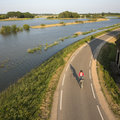News
12 January 2023
Can nature-based climate change adaptation measures benefit the Dutch housing market?

The Netherlands needs to account for climate-driven flood risks when planning new housing advises the Deltaprogramma: where and how we build houses and what governments and homeowners can do to adapt to the increasing flood risks.
19 December 2022
Rose Sharifian is speeding up!

PhD defensed her thesis: "Electrochemical oceanic carbon capture using bipolar membrane electrodialysis" and begins her start-up company op CO2 removal
19 December 2022
Emergent behaviour in the energy transition

A research agenda including a concrete action plan for the following research challenges: behavioural theory and modelling of the energy transition, 2) anticipating emergent behaviour to scale up the energy transition, 3) developing transition narratives, and 4) embracing key/change agents and emergent leadership. The action items vary between quick wins and fundamental research ideas that may, together, help us to better shape the energy transition.
14 December 2022
NWO Perspectief grant for flood protection research

Large areas of the Netherlands are at risk of being flooded. It was only last year, 2021, that rivers in the province of Limburg overflowed. A rise in sea levels and weather extremes, caused by climate change, calls for new technical and nature-based solutions for flood risk management and climate adaptation. The Future Flood Risk Management Technologies (Future FRM Tech) programme, led by TU Delft's Bas Jonkman, will receive an NWO Perspectief grant to work on flood-resilient and climate-adaptive coasts and rivers.
01 December 2022
Most nitrogen deposition from aviation comes from high altitude

Aircraft emit nitrogen oxides and other emissions during both the LTO-phase (taxiing, take-off and landing) and when flying at high altitudes. These emissions return to the ground, resulting in nitrogen deposited over land and water bodies. Using an atmospheric model, researchers at TU Delft have quantified - for the first time - that in 2019 aviation was responsible for just under 1.2% of total global nitrogen deposition from all sources.